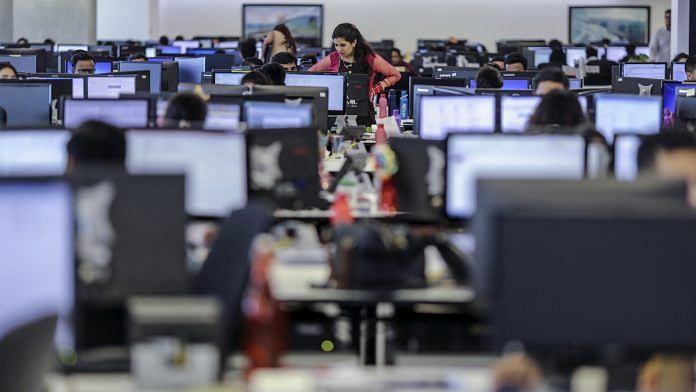European think tank study has predicted that if data localisation is enforced, India’s projected growth could be affected by 20%.
New Delhi: An average Indian worker may lose out on 11 per cent of his/her monthly salary if the proposed data protection laws come into effect.
A study conducted by the European Centre for International Political Economy (ECIPE), a Brussels-based independent policy research think tank, has found that the data localisation provisions of the data protection bill could result in a welfare loss of anywhere between $3.1 billion to $14.5 billion.
Welfare loss is the loss in economic welfare caused by excessive or inadequate production and consumption of goods or resources.
If economy-wide data localisation is enforced, India’s projected growth could be affected by about 20 per cent, the study said. Investments, exports and long-term growth may drop by 1.9 per cent.
However, Justice B.N. Srikrishna (retd), the former Supreme Court judge who headed the panel that drafted the bill, has rebutted the findings, saying “there’s not much merit in these arguments”.
Also read: Data protection panel ‘may have’ been a divided house, decision is collective: Justice Srikrishna
Controversy over localisation
‘Data localisation’ means that data collected on Indian territory should be stored within India. According to the data protection bill, a copy of personal data must be stored in India, and data notified as critical personal data by the government can only be processed in India.
At present, India has no separate law to protect personal data in this era of digital services. The need for a law was recognised during the Puttaswamy case surrounding Aadhaar and the right to privacy.
But numerous controversies have surrounded it — foreign companies, for example, have been objecting to the proposed data localisation provisions since the debate began. Apple, IBM, Microsoft, international software industry body BSA – The Software Alliance, and even the Data Security Council of India (DSCI), an initiative of Indian IT trade association NASSCOM, have all spoken out against choking cross-border flow of data.
They say such a measure would limit innovation, limit quality of tech services companies can provide, and have a negative economic impact.
Even members of the drafting committee like Rama Vedashree, head of DSCI, wrote notes of dissent against the bill’s provisions for data localisation.
The study by Brussels-based ECIPE has now been cited by a November 2018 report, titled ‘Data Localisation In A Globalised World: An Indian Perspective’, by a public policy think tank called The Dialogue.
The report says data protection and localisation laws may hurt India’s hard-fought rise up the World Bank’s Ease of Doing Business rankings.
“The narrative that localisation enhances growth is likely mistaken,” it said.
“The assumption that data localisation will drive AI growth is mistaken… Because many of these data flows are directly or indirectly associated with a commercial transaction, they are essentially traded (between consumer and company).”
Also read: Maternity benefits may cost 1.8 million Indian women their jobs
Justice Srikrishna’s rebuttal
Justice Srikrishna dismissed the ECIPE and The Dialogue’s conclusions, saying “every new law increases the business cost”.
“The other argument is that the price consumers have to pay will increase. I don’t think this is something Indians are not used to. Prices rise more and more, every day. It’s not like the number of billionaires in the country has gone down.”
Srikrishna said a cost-benefit analysis of implementing such a law may indicate more benefit. In fact, he feels that data localisation will augment India’s IT sector.
“(Developed) countries were the first kids on the block. And they are sitting on large reserves of data. I don’t see why we (India) should be bereft of data, why do our boys and girls have to go and sit in California to work on data,” he said.
It is such data that is useful in developing and perfecting emerging tech like artificial intelligence and machine learning, the next ‘cash cows’ across IT sectors.
Srikrishna said the data protection bill is slated to be debated during the winter session of Parliament. There is speculation that a select committee may deliberate on the bill, in which case it won’t become law anytime soon.



